初中英语时态归类整理(含例子练习及答案一般现在时)
(完整版)初中语法一般现在时和现在进行时讲解、练习含答案

一般现在时:一、定义与讲解:一般现在时表示经常或习惯性的动作或一般性事实。
,也可表示现在的状态或主语具备的性格和能力。
通常与副词every day(每天),always(总是),usually(通常),often (经常)sometimes(有时),等时间状语连用。
例:(1)表示事物或人物的特征、状态。
The sky is blue.天空是蓝色的。
Mary’s father is an English teacher. 玛丽的爸爸是一名英语老师。
(2)表示经常性或习惯性的动作。
I get up at six every day.我每天六点起床。
She plays sports every day. 她每天都做运动。
(3)表示客观现实。
The table has four legs.桌子有四条腿。
There are 50 students in my class. 我们班有50个学生。
(4)表示客观真理,科学原理,自然现象,等客观事实或格言谚语等。
The sun rises in the east every day.太阳每天从东方升起。
The earth goes around the sun.地球绕着太阳转。
(5)表示平日的喜好。
I like bananas. We don’t like vegetables.He likes ice cream. She doesn’t like strawberries.二.只有主语在第三人称单数时用动词的“三单形式”,其他人称用动词原形。
★动词三单形式的变化规则:1.(1)多数直接在动词词尾加-s.play — plays like — likesask---asks work---works get---gets call---calls(2)以字母s, x, ch, sh或o结尾的动词,在词尾直接加-es.watch---watches wish---wishes do---does go---goes (3)以“辅音字母加 - y”结尾的动词,要先变y为i再加-es.try---tries study---studies cry---cries fly---flies2.不规则变化:be---- is have----has三、一般现在时的句子转换:(1)变一般疑问句:当句子中有be动词或情态动词时,则把be动词或情态动词(can,could等)提到主语的前面,(口诀:一调二变三问号);(2)变否定句:在be动词或情态动词后面直接加not变成否定句. (be后not 莫忘记)例:①陈述句:She is my sister..疑问句→ Is she your sister? Yes, I am./ No, I’m not.否定句→ She is not my sister.②陈述句:I can play soccer.疑问句→ Can you play soccer? Yes,Ican./ No, I can’t.否定句→ I can not /can’t play soccer.★注意:对一般疑问句的回答:一般用什么问就用什么来回答。
中考时态汇总讲解+习题(现在,过去,将来,进行,完成)
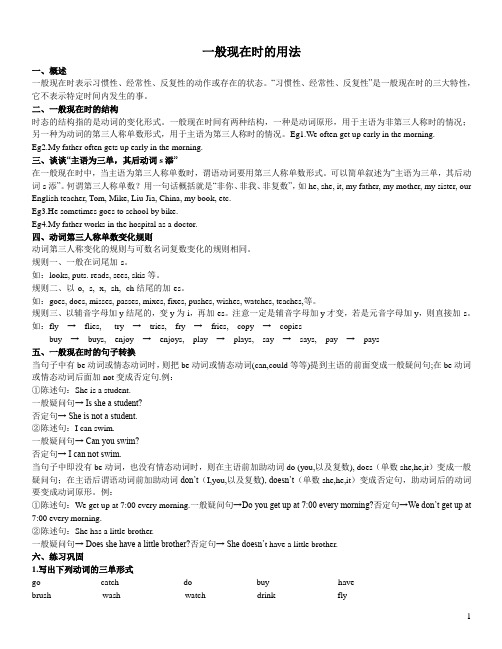
一般现在时的用法一、概述一般现在时表示习惯性、经常性、反复性的动作或存在的状态。
―习惯性、经常性、反复性‖是一般现在时的三大特性,它不表示特定时间内发生的事。
二、一般现在时的结构时态的结构指的是动词的变化形式。
一般现在时间有两种结构,一种是动词原形,用于主语为非第三人称时的情况;另一种为动词的第三人称单数形式,用于主语为第三人称时的情况。
Eg1.We often get up early in the morning.Eg2.My father often gets up early in the morning.三、谈谈“主语为三单,其后动词s添”在一般现在时中,当主语为第三人称单数时,谓语动词要用第三人称单数形式。
可以简单叙述为―主语为三单,其后动词s添‖。
何谓第三人称单数?用一句话概括就是―非你、非我、非复数‖,如he, she, it, my father, my mother, my sister, our English teacher, Tom, Mike, Liu Jia, China, my book, etc.Eg3.He sometimes goes to school by bike.Eg4.My father works in the hospital as a doctor.四、动词第三人称单数变化规则动词第三人称变化的规则与可数名词复数变化的规则相同。
规则一、一般在词尾加-s。
如:looks, puts. reads, sees, skis等。
规则二、以-o, -s, -x, -sh, -ch结尾的加-es。
如:goes, does, misses, passes, mixes, fixes, pushes, wishes, watches, teaches,等。
规则三、以辅音字母加y结尾的,变y为i,再加-es。
注意一定是辅音字母加y才变,若是元音字母加y,则直接加-s。
初中英语八大时态详解及专项训练(附答案)(期末复习资料)!
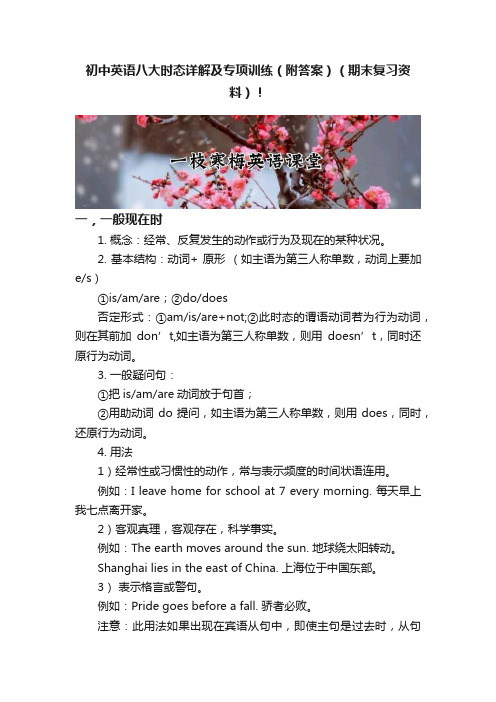
初中英语八大时态详解及专项训练(附答案)(期末复习资料)!一,一般现在时1. 概念:经常、反复发生的动作或行为及现在的某种状况。
2. 基本结构:动词+ 原形(如主语为第三人称单数,动词上要加e/s)①is/am/are;②do/does否定形式:①am/is/are+not;②此时态的谓语动词若为行为动词,则在其前加don’t,如主语为第三人称单数,则用doesn’t,同时还原行为动词。
3. 一般疑问句:①把is/am/are动词放于句首;②用助动词do提问,如主语为第三人称单数,则用does,同时,还原行为动词。
4. 用法1)经常性或习惯性的动作,常与表示频度的时间状语连用。
例如:I leave home for school at 7 every morning. 每天早上我七点离开家。
2)客观真理,客观存在,科学事实。
例如:The earth moves around the sun. 地球绕太阳转动。
Shanghai lies in the east of China. 上海位于中国东部。
3)表示格言或警句。
例如:Pride goes before a fall. 骄者必败。
注意:此用法如果出现在宾语从句中,即使主句是过去时,从句谓语也要用一般现在时。
例如:Columbus proved that the earth is round. 哥伦布证实了地球是圆的。
4)现在时刻的状态、能力、性格、个性。
例如:I don't want so much. 我不要那么多。
He writes good English but does not speak well.他英语写得不错,讲的可不行。
5)一般现在时表示将来含义。
a. 下列动词come, go, arrive, leave, start, begin, return的一般现在时可以表示将来,主要用来表示在时间上已确定或安排好的事情。
例如:The train leaves at six tomorrow morning. 火车明天上午六点开。
中考英语时态大全 练习(含答案)

知识像烛光,能照亮一个人,也能照亮无数的人。--培根
五、对主语的数判断有误 例: Li Ming with me are (be) in Beijing. 答案: is 解析:表面一看是“我和李明两个人在北京”,但 with 在此做伴随状语,不能做主语,故
用 is. 另外,宾语从句中,从句部分若是表示客观真理,不管主句是何时态,从句都要用一般现
5 / 33
知识像烛光,能照亮一个人,也能照亮无数的人。--培根
二、用动词的正确时态填空 1)I________(talk).You________(listen)tO me now. 2)Look,the boy__________(run)fast. 3)----What are you doing? ----I_________(do) my homework. 4)----_______the students_______(read) English. ----Yes,they are. 5)Tom_______(not study)English.He is studying Chinese. 6)----Who_______(sing)a song? ----Li Ying is. 7)The girl_______(not eat)bananas now. 8)----Where____they____(stand)? ----They are standing over there. 9)Look! The boy over there_______(ply) a model plane. 10)----What is Meimei doing now? ----She______(watch)TV with her parents 11)He____(study) English very hard. 12)We often____(buy)books and things like that in the shop. 13)Polly____(not eat) a banana now.
(完整版)初中一般现在时和现在进行时讲解、练习及答案

一般现在时和现在进行时一般现在时用法:1.现阶段经常性习惯性动作或存在的状态I leave home for school at 7 every morning.2.客观真理, 客观存在,科学事实The earth moves around the sun.Shanghai lies in the east of China.3.在格言或警句中Pride goes before a fall.骄者必败。
常用时间状语:sometimes, often, every day, usually, always 等构成:1.动词用原形I like it.2.当主语是第三人称单数时,动词要加-s(-es)She likes it.3.be 动词用am,is, areI am a teacher.He is a boy. They are girls.否定形式:1.don’t+动词原形I don’t like it.They don’t like it.2.当主语是第三人称单数时,则为doesn’t+动词原形He doesn’t like it.一般疑问句:把do 或does 放在主语的前面,后面动词用原形Do you like it? Does Ann like it?注意:动词三单的变化规则【巩固练习】写出下列动词的第三人称单数drink ________ stay ________ look _________ have_______ do_________pass_______ carry ________ come________ watch______ brush________1. Mrs. Smith _____ the windows every day.A. is cleaningB. cleanC. cleans2. On Sunday he sometimes _____ his clothes and sometimes _____ some shopping.A. wash/ doB. is washing/ is doingC. washes/ does3. She _____ up at six in the morning. A. get B. gets C. getting现在进行时1.定义:表示正在发生或进行的动作结构:be(am,is,are)+动词现在分词形式(简写:be+动词-ing)A、陈述句(肯定句)主语+be(am,is,are)+现在分词,如:I am reading English.我正在读英语。
最新各种时态总结、练习及答案

22. Li Xing goes home late on Friday afternoon . (对画线部分提问) When does Li Xing go home late ?
23. This girl is Joy Smith . (变为特殊疑问 句) Who is this girl ?
1.be 动词的一般现在时的句式: 肯定句:主语+be+表语(n., adj.等)
e.g. He is a worker. You are thirteen. They are in the classroom.
否定句:主语+be+ not+表语
e.g. He is not a worker. You aren’t thirteen. They aren’t in the classroom. e.g. Is he a worker? Yes, he is./No, he isn’t. Are you thirteen? Are they in the classroom? Yes, they are. No, they aren’t.
14. Maria and Jack come to this school on Monday . (对画线部分提 问) When do Maria and Jack come to this school ?
15. Titanic is really a great sad movie . (对画 线部分提问) How is Titanic ? 16. Mike can play the guitar . (对画线部分提 问) What can Mike do ? 17. Julia and her mother can live (居住) in the same city . (变一般疑问句) Do Julia and her mother live in the same city ?
初中英语语法八大时态总结及练习题
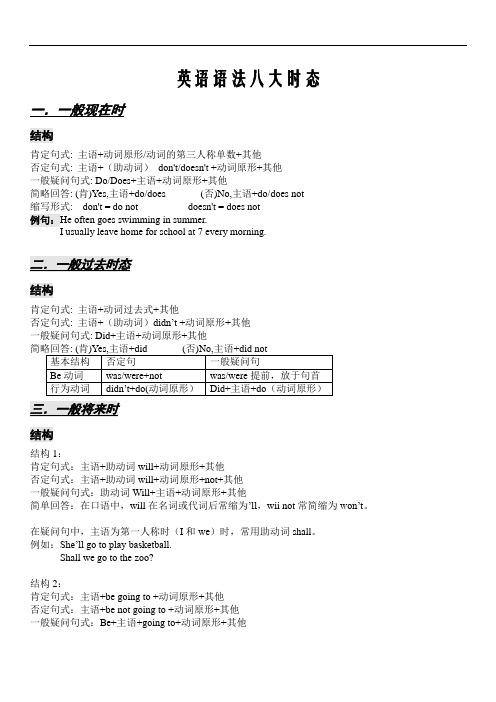
英语语法八大时态一.一般现在时结构肯定句式: 主语+动词原形/动词的第三人称单数+其他否定句式: 主语+(助动词)don't/doesn't +动词原形+其他一般疑问句式: Do/Does+主语+动词原形+其他简略回答: (肯)Yes,主语+do/does (否)No,主语+do/does not缩写形式: don't = do not doesn't = does not例句:He often goes swimming in summer.I usually leave home for school at 7 every morning.二.一般过去时态结构肯定句式: 主语+动词过去式+其他否定句式: 主语+(助动词)didn’t +动词原形+其他一般疑问句式: Did+主语+动词原形+其他基本结构否定句一般疑问句Be动词was/were+not was/were提前,放于句首行为动词didn’t+do(动词原形)Did+主语+do(动词原形)三.一般将来时结构结构1:肯定句式:主语+助动词will+动词原形+其他否定句式:主语+助动词will+动词原形+not+其他一般疑问句式:助动词Will+主语+动词原形+其他简单回答:在口语中,will在名词或代词后常缩为’ll,wii not常简缩为won’t。
在疑问句中,主语为第一人称时(I和we)时,常用助动词shall。
例如:She’ll go to play basketball.Shall we go to the zoo?结构2:肯定句式:主语+be going to +动词原形+其他否定句式:主语+be not going to +动词原形+其他一般疑问句式:Be+主语+going to+动词原形+其他简略回答:(肯)Yes,主语+be (否)No,主语+be not将来时其他表示法1)be going to表示将来表示说话人的打算、计划、安排或根据迹象判断必然或很可能发生的事情。
九年级英语时态复习练习题及答案
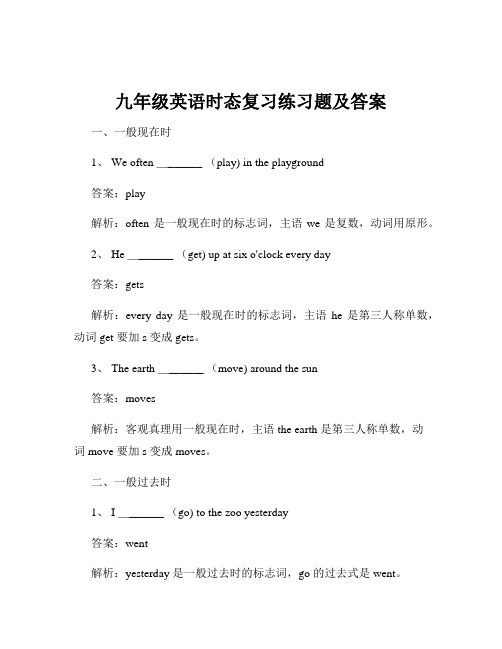
九年级英语时态复习练习题及答案一、一般现在时1、 We often _______ (play) in the playground答案:play解析:often 是一般现在时的标志词,主语 we 是复数,动词用原形。
2、 He _______ (get) up at six o'clock every day答案:gets解析:every day 是一般现在时的标志词,主语he 是第三人称单数,动词 get 要加 s 变成 gets。
3、 The earth _______ (move) around the sun答案:moves解析:客观真理用一般现在时,主语 the earth 是第三人称单数,动词 move 要加 s 变成 moves。
二、一般过去时1、 I _______ (go) to the zoo yesterday答案:went解析:yesterday 是一般过去时的标志词,go 的过去式是 went。
2、 She _______ (be) happy last week答案:was解析:last week 是一般过去时的标志词,主语 she 是第三人称单数,be 动词用 was。
3、 They _______ (not do) their homework last night答案:didn't do解析:last night 是一般过去时的标志词,否定句要用助动词didn't,后面接动词原形 do。
三、一般将来时1、 We _______ (have) a party next week答案:will have / are going to have解析:next week 是一般将来时的标志词,可以用 will +动词原形或者 be going to +动词原形的结构。
2、 He _______ (come) back tomorrow答案:will come / is going to come解析:tomorrow 是一般将来时的标志词,同理可用 will +动词原形或者 be going to +动词原形。
英语一般现在时题20套(带答案)含解析
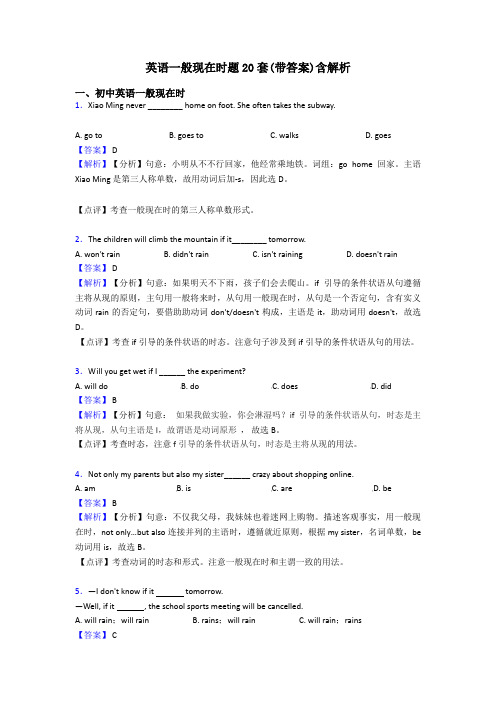
英语一般现在时题20套(带答案)含解析一、初中英语一般现在时1.Xiao Ming never ________ home on foot. She often takes the subway.A. go toB. goes toC. walksD. goes【答案】 D【解析】【分析】句意:小明从不不行回家,他经常乘地铁。
词组:go home回家。
主语Xiao Ming 是第三人称单数,故用动词后加-s,因此选D。
【点评】考查一般现在时的第三人称单数形式。
2.The children will climb the mountain if it________ tomorrow.A. won't rainB. didn't rainC. isn't rainingD. doesn't rain【答案】 D【解析】【分析】句意:如果明天不下雨,孩子们会去爬山。
if 引导的条件状语从句遵循主将从现的原则,主句用一般将来时,从句用一般现在时,从句是一个否定句,含有实义动词rain的否定句,要借助助动词don't/doesn't构成,主语是it,助动词用doesn't,故选D。
【点评】考查if引导的条件状语的时态。
注意句子涉及到if引导的条件状语从句的用法。
3.Will you get wet if I ______ the experiment?A. will doB. doC. doesD. did【答案】 B【解析】【分析】句意:如果我做实验,你会淋湿吗?if引导的条件状语从句,时态是主将从现,从句主语是 I,故谓语是动词原形,故选B。
【点评】考查时态,注意f引导的条件状语从句,时态是主将从现的用法。
4.Not only my parents but also my sister______ crazy about shopping online.A. amB. isC. areD. be【答案】 B【解析】【分析】句意:不仅我父母,我妹妹也着迷网上购物。
初中英语时态讲解及练习(含答案)

初中英语时态讲解及练习(含答案)时态1. 一般现在时●形式:do does(单数第三人称)●意义:一般现在时表示客观的、普遍性的真理以及经常性的事件。
●用法:A) 表示现在发生的动作、情况、状态和特征。
B) 经常性、习惯性动作。
e.g.:He always helps others. (他总是帮助别人。
)He often goes to the gym.C) 客观事实和普遍真理。
尤其要注意,如果前后文不是一般现在时,则无法保持主句、从句时态一致。
e.g.: The sun rises in the east and sets in the west.Knowledge is power.●这一用法场合一些表动作频率的时间副词连用:1). 表示肯定的频率副词:always, frequently, usually, sometimes, generally, occasionally, often etc.2). 表示否定的频率副词:never, seldom, rarely etc.这些副词的位置:在Be动词后,实义动词前。
e.g. He is always late.2. 一般过去时●形式:did●意义:一般过去时表示在过去的某一特定时间发生和结束的活动或情况。
●用法:A) 表示过去某个时间发生的动作或情况。
e.g.: I saw him in the library yesterday morning. (有特定的时间状语)yesterday, yesterday evening, last night/month/spring/year, the night before last(前天晚上),three days/months/years ago, in 1999 etc.。
这些时间状语之前不用加介词。
B) 表示过去习惯性动作,一直持续或反复发生的动作,此时可与表示拼读的时间副词连用。
e.g.: I slept for eight hours last night. (表示在过去某一段时间内持续的动作,但这动作现在已经结束了)3. 一般将来时●形式:will/shall do或be going to do●意义:一般将来时表示在未来的某个时间将要发生的某个动作或状态。
初三英语语法时态总结(含时态选择题及其答案)
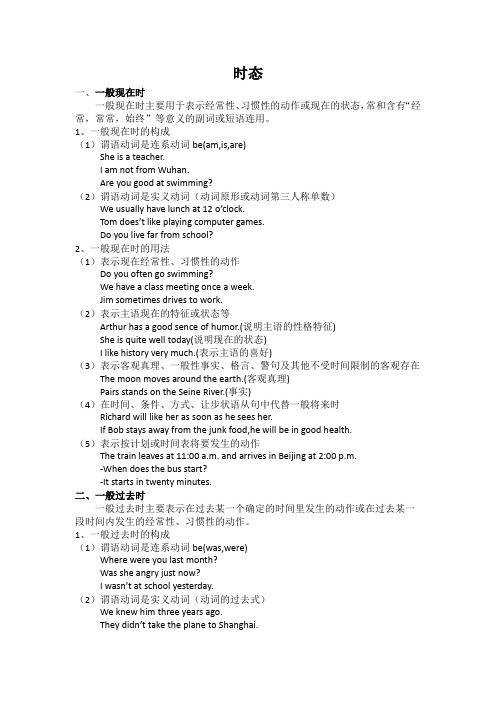
时态一、一般现在时一般现在时主要用于表示经常性、习惯性的动作或现在的状态,常和含有“经常,常常,始终”等意义的副词或短语连用。
1、一般现在时的构成(1)谓语动词是连系动词be(am,is,are)She is a teacher.I am not from Wuhan.Are you good at swimming?(2)谓语动词是实义动词(动词原形或动词第三人称单数)We usually have lunch at 12 o’clock.Tom does’t like playing computer games.Do you live far from school?2、一般现在时的用法(1)表示现在经常性、习惯性的动作Do you often go swimming?We have a class meeting once a week.Jim sometimes drives to work.(2)表示主语现在的特征或状态等Arthur has a good sence of humor.(说明主语的性格特征)She is quite well today(说明现在的状态)I like history very much.(表示主语的喜好)(3)表示客观真理、一般性事实、格言、警句及其他不受时间限制的客观存在The moon moves around the earth.(客观真理)Pairs stands on the Seine River.(事实)(4)在时间、条件、方式、让步状语从句中代替一般将来时Richard will like her as soon as he sees her.If Bob stays away from the junk food,he will be in good health.(5)表示按计划或时间表将要发生的动作The train leaves at 11:00 a.m. and arrives in Beijing at 2:00 p.m.-When does the bus start?-It starts in twenty minutes.二、一般过去时一般过去时主要表示在过去某一个确定的时间里发生的动作或在过去某一段时间内发生的经常性、习惯性的动作。
初中英语八大时态总结(精讲、习题、答案)
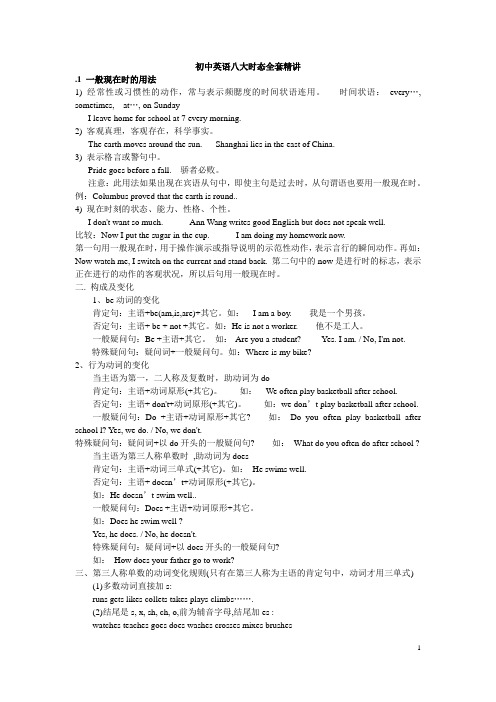
初中英语八大时态全套精讲.1 一般现在时的用法1) 经常性或习惯性的动作,常与表示频腮度的时间状语连用。
时间状语:every…, sometimes,at…, on SundayI leave home for school at 7 every morning.2) 客观真理,客观存在,科学事实。
The earth moves around the sun.Shanghai lies in the east of China.3) 表示格言或警句中。
Pride goes before a fall.骄者必败。
注意:此用法如果出现在宾语从句中,即使主句是过去时,从句谓语也要用一般现在时。
例:Columbus proved that the earth is round..4) 现在时刻的状态、能力、性格、个性。
I don't want so much. Ann Wang writes good English but does not speak well.比较:Now I put the sugar in the cup.I am doing my homework now.第一句用一般现在时,用于操作演示或指导说明的示范性动作,表示言行的瞬间动作。
再如:Now watch me, I switch on the current and stand back. 第二句中的now是进行时的标志,表示正在进行的动作的客观状况,所以后句用一般现在时。
二. 构成及变化1、be动词的变化肯定句:主语+be(am,is,are)+其它。
如:I am a boy.我是一个男孩。
否定句:主语+ be + not +其它。
如:He is not a worker.他不是工人。
一般疑问句:Be +主语+其它。
如:-Are you a student?-Yes. I am. / No, I'm not.特殊疑问句:疑问词+一般疑问句。
初中英语时态知识梳理及练习题含答案
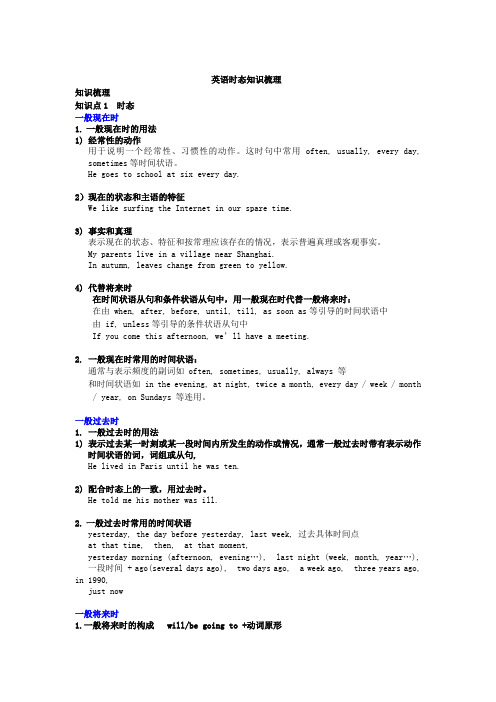
英语时态知识梳理知识梳理知识点1 时态一般现在时1.一般现在时的用法1) 经常性的动作用于说明一个经常性、习惯性的动作。
这时句中常用often, usually, every day, sometimes等时间状语。
He goes to school at six every day.2)现在的状态和主语的特征We like surfing the Internet in our spare time.3) 事实和真理表示现在的状态、特征和按常理应该存在的情况,表示普遍真理或客观事实。
My parents live in a village near Shanghai.In autumn, leaves change from green to yellow.4) 代替将来时在时间状语从句和条件状语从句中,用一般现在时代替一般将来时:在由 when, after, before, until, till, as soon as等引导的时间状语中由 if, unless等引导的条件状语从句中If you come this afternoon, we’ll have a meeting.2. 一般现在时常用的时间状语:通常与表示频度的副词如 often, sometimes, usually, always 等和时间状语如 in the evening, at night, twice a month, every day / week / month / year, on Sundays 等连用。
一般过去时1. 一般过去时的用法1) 表示过去某一时刻或某一段时间内所发生的动作或情况,通常一般过去时带有表示动作时间状语的词,词组或从句,He lived in Paris until he was ten.2) 配合时态上的一致,用过去时。
He told me his mother was ill.2.一般过去时常用的时间状语yesterday, the day before yesterday, last week, 过去具体时间点at that time, then, at that moment,yesterday morning (afternoon, evening…), last night (week, month, year…), 一段时间 + ago(several days ago), two days ago, a week ago, three years ago, in 1990,just now一般将来时1.一般将来时的构成 will/be going to +动词原形2. 一般将来时的用法1) will/won’t表示预测的将来,即认为某事肯定会发生;还可表示将来的意愿;将来的事实。
初中英语八大时态讲解及练习(含答案)
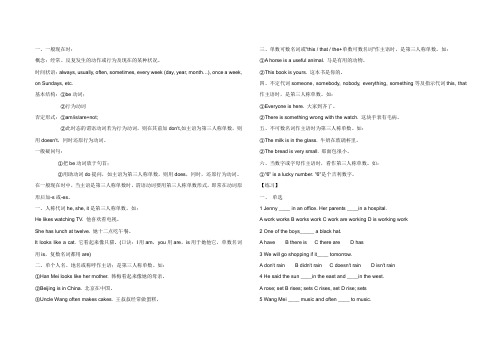
一、一般现在时:概念:经常、反复发生的动作或行为及现在的某种状况。
时间状语:always, usually, often, sometimes, every week (day, year, month…), once a week, on Sundays, etc.基本结构:①be动词;②行为动词否定形式:①am/is/are+not;②此时态的谓语动词若为行为动词,则在其前加don't,如主语为第三人称单数,则用doesn't,同时还原行为动词。
一般疑问句:①把be动词放于句首;②用助动词do提问,如主语为第三人称单数,则用does,同时,还原行为动词。
在一般现在时中,当主语是第三人称单数时,谓语动词要用第三人称单数形式,即常在动词原形后加-s或-es。
一、人称代词he, she, it是第三人称单数。
如:He likes watching TV. 他喜欢看电视。
She has lunch at twelve. 她十二点吃午餐。
It looks like a cat. 它看起来像只猫。
(口诀:I用am,you用are,is用于她他它,单数名词用is,复数名词都用are)二、单个人名、地名或称呼作主语;是第三人称单数。
如:①Han Mei looks like her mother. 韩梅看起来像她的母亲。
②Beijing is in China. 北京在中国。
③Uncle Wang often makes cakes. 王叔叔经常做蛋糕。
三、单数可数名词或"this / that / the+单数可数名词"作主语时,是第三人称单数。
如:①A horse is a useful animal. 马是有用的动物。
②This book is yours. 这本书是你的。
四、不定代词someone, somebody, nobody, everything, something等及指示代词this, that 作主语时,是第三人称单数。
初中英语时态练习题及答案

初中英语时态练习题及答案1. (一般现在时) I ___ (go) to school at 7:00 every morning.答案: go2. (一般过去时) She ___ (visit) her grandparents last weekend.答案: visited3. (一般将来时) We ___ (have) a birthday party next Sunday.答案: will have4. (现在进行时) Look! The children ___ (play) in the park.答案: are playing5. (过去进行时) What ___ (do) you ___ (do) at this time yesterday?答案: were, doing6. (将来进行时) By this time tomorrow, I ___ (be) ___ (study) for my math test.答案: will be, studying7. (现在完成时) They ___ (already/finish) their homework.答案: have already finished8. (过去完成时) When I got to the cinema, the movie ___ (already/start).答案: had already started9. (将来完成时) By the end of this year, he ___ (travel) to10 different countries.答案: will have traveled10. (现在完成进行时) She ___ (teach) English for five years.答案: has been teaching答案解析1. 一般现在时表示习惯性的动作或状态,用动词原形或第三人称单数形式。
初中英语语法: 时态:一般现在时(超详细讲解、重难点归纳+练习、测试)

一般现在时一、定义(什么情况会使用一般现在时?):1. 表示经常性或习惯性的动作。
如:I get up at six every day.__________________________________________________________________________________________________________________________ 2.表示不会随时间发生变化的客观事实。
如:The earth goes around the sun.__________________________________________________________________________________________________________________________ 二、时间标志词:①每……:every week (day/ year/ month);on Mondays②……一次:once a week (day /month/ year)③频度副词:sometimes;usually;often;never;sometimes三、句子结构:①含有be动词:主语+ be(am/ is/ are)+其它。
★am用于I,are用于you,is用于非I、非you、非复数时。
如:I am a girl.She is my sister.__________________________________________________________________________________________________________________________ 1. 否定句:主语+be(am/is/are)+not+其它。
如:He is a worker→ He is not a worker__________________________________________________________________________________________________________________________ 2. 一般疑问句:Be+主语+其它。
- 1、下载文档前请自行甄别文档内容的完整性,平台不提供额外的编辑、内容补充、找答案等附加服务。
- 2、"仅部分预览"的文档,不可在线预览部分如存在完整性等问题,可反馈申请退款(可完整预览的文档不适用该条件!)。
- 3、如文档侵犯您的权益,请联系客服反馈,我们会尽快为您处理(人工客服工作时间:9:00-18:30)。
一,一般现在时
1、概念:经常、反复发生的动作或行为及现在的某种状况。
2、时间状语:always, usually, often, sometimes, every (week day, year, month), once on Sundays,
3、基本结构:动词+原形(如果主语为第三人称单数,动词上要改为第三人称单数形式)
4、否定形式:主语/三单+do/does not+V原+其他
5、一般疑问句:用助动词do提问,如果主语为第三人称单数,则用does,同时,还原行为动词。
6、例句:
It seldom snows here、
He is always ready to help others、
Action speaks louder than words、不要做思想的巨人,行动的侏儒
Do you like it? 你喜欢这个吗?
No,I don't like it at all/Yes,I like very much 不,我不喜欢/是的,我很喜欢。
7 、用法:
1) ,表示习惯性的动作
2、)客观真理,客观存在,科学道理。
3)格言警句
4)现在的状态,能力,性格,个性。
8、变化规律
当动词是第三人称单数时,动词应该像名词的单数变动词那样加s,如下:一)一般在词后加s。
如:comes, spells, waits, talks, sees, dances, trains
二)在x, sh, ch, s, tch后加es。
如:watches, washes, wishes, finishes 三)1)、以辅音字母加y结尾的变y为i再加es。
如:study-studies,
hurry-hurries, try-tries
2)、以元音字母加y结尾的直接加s。
如:plays, says, stays, enjoys, buys 四)以o结尾加es。
如:does, goes
五)特殊的有:are-is, have-has
练习:
1、 My English teacher ______about thirty years old, but he_____younger than he really is、
A、 is, look B 、is, looks C、 am, look
2、 Jim ___very hard, but he____still a little weak in Chinese、
A、 studies, is
B、 study, is
C、doesn’t study, is
3、 We all know that the sun_____round the earth、
A、 goes
B、don’t go
C、doesn’t go
4、 There ____twelve months in a year and January____first、
A、 is, comes
B、 are, come
C、 are, comes
5、 Who _____the kite best of all, Jim、 Lucy or Lily?
A 、flies B、 fly C 、are flying
6、 _____the Great Wall one of the places of great interests in China?
A、Was
B、 Do
C、 Is
7、 ____you usually _____to school with classmates?
A、 Do, comes
B、 does, come
C、 Do, come
8、 ____she___home at six o’clock every morning?
A、 Do, comes
B、 Does、 Come
C、 Do, come
9、 My mother ____like watching TV, so she____to bed very early every evening、
A, doesn’t , go B、don’t, go C、doesn’t, goes
10、Mr Green usually______newspapers after supper every day、
A、 read
B、 reading
C、 reads
BACCA CCBCC。
